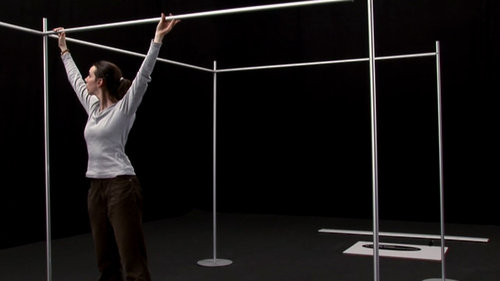5/5/2007
Martin Beck
Orchard, New York
Beck's exhibition investigates a shift in exhibition formats in the late 1950s and early 1960s. In the development of modernism, the art sector had been the primary field within which experimentation with display strategies and new forms of perceiving and relating to visual culture were developed.

The details are not the details
Martin Beck’s exhibition The details are not the details investigates a
shift in exhibition formats in the late 1950s and early 1960s. In the
development of modernism, the art sector had been the primary field
within which experimentation with display strategies and new forms of
perceiving and relating to visual culture were developed. However,
during this period commercial exhibiting – trade fairs, corporate, and
government exhibits – increasingly became the site where new
presentational formats and techniques appeared.
Key to this moment is the concept that “information” (and access
to it) is integral to a modernizing drive in which emancipatory
practices, propaganda and corporate advertising started to freely flow
into each other. Much experimentation within the commercial field was
driven by the idea of indexing and structuring with a special emphasis
on making information visible as well as portable. On a practical level
this took the form of modularized exhibition systems based on connector
joints which allow for quick, unskilled assembly and endless
rectangular expansion. Many exhibition systems developed in this period
bear striking resemblance to visual strategies that surface only a few
years later within minimalism and conceptual art practices. Such
systems submit information and its dissemination to a geometric matrix,
the social logic of which can be described as one of the ultimate tools
of modernity’s exercise of power. At the moment when the exhibition
seems to become a mobile emancipatory agent it succumbs to the symbolic
logic of control.
The centerpiece of Beck’s exhibition is a new filmic installation
titled About the Relative Size of Things in the Universe. The work
consists of a twelve minute tracking shot showing the assembly and
disassembly of a historic exhibition system by the designer George
Nelson, which Beck had reconstructed from archival documentation. The
film’s precisely choreographed details lay out a field of references to
modern exhibition history, to minimalist dance performance, to filmic
techniques in Michael Snow’s as well as Jean-Marie Straub/Danièle
Huillet’s work, and also to contemporary consequences of rationalized
production.
A series of silk-screened drawings that address spatial
possibilities of exhibiting complements the film work and, together
with a curated arrangement of period books on exhibiting, are the key
for opening up a series of connections to minimalism and conceptual
art. The arc Beck’s The details are not the details lays out is further
defined by inclusion of the seminal 1967 Aspen Magazine curated by
Brian O’Doherty, a multiple and poster by Sol LeWitt, and a
photographic plate by Eadweard Muybridge.
Opening reception: Sunday, May 6, 6 – 8 PM
Orchard
47 Orchard St. - New York
Gallery hours: Thursday – Sunday 1 – 6 PM



